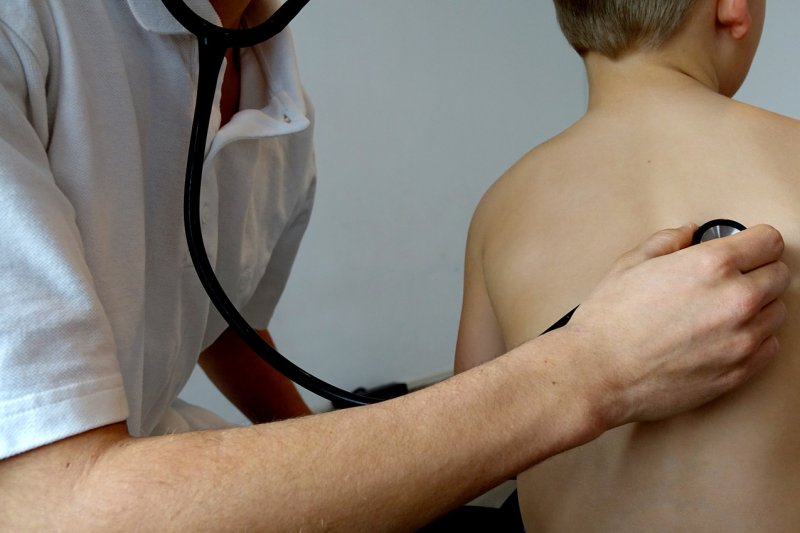Many U.S. children receive unnecessary medical care, study finds. Photo by
Semevent/Pixabay
Jan. 7 (UPI) -- Roughly one in 10 American children receive unnecessary healthcare services, driving up costs and exposing them to potential side effects, a new analysis suggests.
An analysis of medical data for 8.6 million publicly and privately insured children in 12 states, published Tuesday in the journal Pediatrics, suggests young people receive diagnostic tests, imaging tests and prescription drugs they ultimately don't need.
Many were treated for conditions, like acute sinus infections, they didn't have and were given antibiotics for colds, which is considered inappropriate according to most care guidelines.
Part of the issue may be a fear of missing something, on the part of both doctors and parents, researchers say.
"There are steps that parents can take to minimize the possibility of unnecessary care for their children," study co-author Kao-Ping Chua, a pediatrician and researcher at Michigan Medicine's C.S. Mott Children's Hospital and the Susan B. Meister Child Health Evaluation and Research Center, told UPI. "It's important to remember that for the average child in good health, the vast majority of illnesses resolve on their own."
"This means that there is a low probability that most interventions will alter the course of most illnesses -- for example, whether someone receives or does not receive an antibiotic for a cold, they will get better," Chua said.
Chua and his colleagues evaluated patient-care data from 2014, finding that 11 percent of publicly insured children and 9 percent of privately insured children received "low-value" care, or care that offered little benefit to their health, at least once. In addition, 4 percent and 3 percent of each group received similar low-value care at least twice during the same period.
Overall, one in 33 publicly and privately insured kids received an unnecessary diagnostic test at least once in 2014, and about one in 12 publicly insured and one in 20 privately insured children received an unneeded prescription drug at least once.
This latter group included those who were given antibiotics for colds, infants administered cough and cold medications and babies who received acid-blockers for uncomplicated reflux, or simple indigestion.
In addition to being wasteful -- and leading to inflated healthcare costs -- Chua noted, this unnecessary care may also have health consequences for the children who receive it.
Overuse of antibiotics, for example, can increase antibiotic resistance and the risk for allergic reactions. MRIs can also expose children to the risks of sedation, while CT scans expose them to radiation, which can increase lifetime risk of cancer.
"Unnecessary antibiotics increase the risk of diarrhea, antibiotic resistance and allergic reactions, including life-threatening anaphylaxis," Chua said. "Cough and cold medications can cause rapid heart rates and seizures in young children, particularly when too much medication is given. Exposure to acid blockers in infancy has been associated with an increased risk of developing food allergies and other allergic diseases later in childhood."
While Chathryn Donaldson, director of communications for America's Health Insurance Plans, told UPI that the vast majority of children whose cases were reviewed received appropriate care, she also pointed out that doctors and health insurance providers could "work together to do more to prevent unnecessary or inappropriate medical treatments."
The insurance industry, she said, has been incorporating a number of approaches in recent years to reduce the use of unnecessary care services, including creating financial incentives to encourage the use of higher-value, evidence-based treatments and requiring prior authorization or pre-authorization for interventions.
"Health insurance providers are shifting toward more value-based care, which aligns incentives with doctors and promotes a patient-centered approach where treatments are tailored to the individual," Donaldson said.
Aside from reducing costs across the population, Donaldson said the aim is to enhance individual care, as well as improve population health.
The initiatives may help address what Chua describes as the "interventionist culture" of American medicine. Doctors fear missing something -- and would rather treat symptoms and risk side effects rather than do nothing -- while parents "understandably want to relieve their children's suffering."
In this context, both parents and clinicians tend to think that prescribing a drug or ordering a test is better than doing nothing, he said.
"Parents should feel empowered to ask questions about the risks and benefits of interventions, and should make it clear to clinicians that they are comfortable with no intervention if that's the best course of action," he added. "They should do their best to find a clinician who practices in an evidence-based manner."















